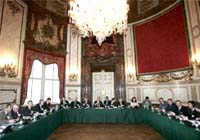Meeting in Vienna to decide status of Kosovo
The first round of talks between Belgrade and Pristina to decide the status of Kosovo has taken place in the Austrian capital. The talks are being held behind closed doors under the mediation of Albert Rochas, the UN deputy special envoy to Kosovo and former General Secretary of Austrian Ministry of Foreign Affairs. Advisers of the President and Prime Minster of Serbia represented Serbia and Lutvi Haziri, member of the local Kosovo autonomy, heads a delegation of Kosovo Albanians.

Photo: Meeting in Vienna to decide status of Kosovo
The devolution of power and reform of local governing bodies were the main themes of the first set of talks. The debate over Kosovo’s status has been put off for the time being because the main positions of those involved are so different. The first step in advancing the talks to this debate is to talk about the problems present in everyday life in the provinces. On Monday the delegates concerned themselves with the local governing bodies in a social sphere; health care, education and culture. On Tuesday the talks will continue to be based on social bodies; judicial bodies, the police and state enterprises.
Serbia wants sixteen new communities to be created in Kosovo for the dominant Serbian population which are meant to establish administrative parity with proportionate ethnic representation like that found in Bosnia and Herzegovina . In turn the Albanians area offering to establish unified administrative structures controlled by one joint governing body. The chances of the Serbians maintaining their stance are slim since the Kosovo Albanians’ proposals appear more attractive to the European Union in terms of the possible integration of this region.
The EU, although not taking an active role in the talks, does have a great interest in the Balkans and especially in the plan to open up to South-Eastern Europe. Furthermore, the US government, the EU and NATO are all present at the current meeting.
The status of Kosovo, although it ought to be a topic of discussion at the talks, has almost been discarded. At the last meeting in London the group of diplomats said that a final decision would be taken after a national referendum on the subject. It is difficult to predict the outcome of such a referendum since the majority of the population is made up of ethnic Albanians. Under the circumstances the best the Serbians can hope for is the preservation of their rights in an independent Kosovo.
As possible compensation for Belgrade ’s compliance in resolving the Kosovo issue, they are offering Serbia an incentive in light of their possible entry to the EU. “If Belgradedoes not observe the rules, then theycan forget about their aims and interests,” announced the UN special envoy to Kosovo Martti Ahtisaari.
In Kosovo, the historical part of Serbia , almost 90% of the population is made up of Albanians. There are about 100 000 Serbs. The area has been under UN control since the military campaign led by NATO in 1999. Pristina insists on becoming independent. Belgrade, however, agrees to giving the Kosovo Albanians self-governance but only within the confines of one state.
Kosovo’s fate must be decided by direct dialogue between Belgrade and Pristina and the solution must accommodate the interests of all inhabitants of the region . Georgy Poltavchenko the current Presidential Envoy to the Central Federal District in Russia, who was in Serbia for a two-day visit, said that this must be so. In his words, the aim of the trip is to widen the cultural, spiritual and economic links between Russia and Serbia . On Monday Poltavchenko and the Serbian President Boris Tadic visited Saint Sheba Cathedral, a Russian orthodox church, and also went to the Ivan Goran Kovachich School which specializes in Russian language tuition.
The Serbian President announced to journalists that he planned on Tuesday to have discussions with his Russian guest about Kosovo and ways to resolve the issue. Tadic pointed out that Russia and Serbia have much in common. “The main topic of discussion at this stage is the decentralization of power in Kosovo which will resolve many of the problems that ordinary people face in their everyday life. If we manage to come to a resolution on the status of Kosovo, we can remain in closer dialogue in the future,” said the Serbian President.
The President of Moldova Vladimir Voronin thinks that the experience of solving the interethnic conflict in Kosovo will not have any bearing on a possible resolution to the problems in Transdniestr. “Settlement of the Kosovo issue is not something desirable for Pristina,” announced Voronin who was in Tehran on an official visit. At a press conference after meeting with Albanian President Alfred Moisiu, Voronin said that “the Kosovo and the Transdniestr conflicts greatly differ from one another and that the methods taken to solve the problems must be appropriate.” “It is impossible to apply the same methods to different problems. Each problem should be analyzed individually.” asserted Voronin.
Strana.Ru
Translated by Michael Simpson



